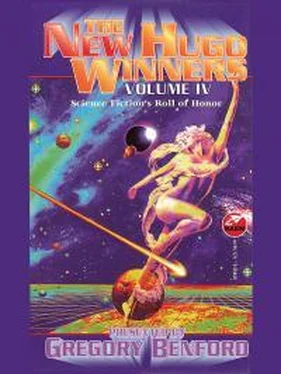Грегори Бенфорд - The New Hugo Winners - Volume IV
Здесь есть возможность читать онлайн «Грегори Бенфорд - The New Hugo Winners - Volume IV» весь текст электронной книги совершенно бесплатно (целиком полную версию без сокращений). В некоторых случаях можно слушать аудио, скачать через торрент в формате fb2 и присутствует краткое содержание. Год выпуска: 1997, ISBN: 1997, Издательство: Baen, Жанр: Фантастика и фэнтези, на английском языке. Описание произведения, (предисловие) а так же отзывы посетителей доступны на портале библиотеки ЛибКат.
- Название:The New Hugo Winners - Volume IV
- Автор:
- Издательство:Baen
- Жанр:
- Год:1997
- ISBN:0-671-87852-2
- Рейтинг книги:5 / 5. Голосов: 1
-
Избранное:Добавить в избранное
- Отзывы:
-
Ваша оценка:
- 100
- 1
- 2
- 3
- 4
- 5
The New Hugo Winners - Volume IV: краткое содержание, описание и аннотация
Предлагаем к чтению аннотацию, описание, краткое содержание или предисловие (зависит от того, что написал сам автор книги «The New Hugo Winners - Volume IV»). Если вы не нашли необходимую информацию о книге — напишите в комментариях, мы постараемся отыскать её.
The New Hugo Winners - Volume IV — читать онлайн бесплатно полную книгу (весь текст) целиком
Ниже представлен текст книги, разбитый по страницам. Система сохранения места последней прочитанной страницы, позволяет с удобством читать онлайн бесплатно книгу «The New Hugo Winners - Volume IV», без необходимости каждый раз заново искать на чём Вы остановились. Поставьте закладку, и сможете в любой момент перейти на страницу, на которой закончили чтение.
Интервал:
Закладка:
He had the reconciliation scene to get through—so simple that it would require the most delicate touches. There would be no background, no souped-up voices, no images, for at this point Shakespeare became simple. Nothing beyond simplicity was needed.
Lear was an old man, just an old man. Cordelia, having found him, was a loving daughter, with none of the majesty of Goneril, none of the cruelty of Regan, just softly endearing.
Lear, his madness burned out of him, is slowly beginning to understand the situation. He scarcely recognizes Cordelia at first and thinks he is dead and she is a heavenly spirit. Nor does he recognize the faithful Kent.
When Cordelia tries to bring him back the rest of the way to sanity, he says:
"Pray, do not mock me.
I am a very foolish fond old man.
Fourscore and upward, not an hour more nor less.
And, to deal plainly,
I fear I am not in my perfect mind.
Methinks I should know you, and know this man;
Yet I am doubtful; for I am mainly ignorant
What place this is; and all the skills I have
Remembers not these garments; nor I know not
Where I did lodge last night. Do not laugh at me;
For (as I am a man) I think this lady
To be my child Cordelia."
Cordelia tells him she is and he says:
"Be your tears wet? Yes, faith. I pray weep not.
If you have poison for me, I will drink it.
I know you do not love me; for your sisters
Have, as I do remember, done me wrong.
You have some cause, they have not."
All poor Cordelia can say is "No cause, no cause."
And eventually, Willard was able to draw a deep breath and say, "We've done all we can do. The rest is in the hands of the public."
It was a year later that Willard, now the most famous man in the entertainment world, met Gregory Laborian. It had come about almost accidentally and largely because of the activities of a mutual friend. Willard was not grateful.
He greeted Laborian with what politeness he could manage and cast a cold eye on the time-strip on the wall.
He said, "I don't want to seem unpleasant or inhospitable, Mr.—uh—but I'm really a very busy man, and don't have much time."
"I'm sure of it, but that's why I want to see you. Surely, you want to do another compu-drama."
"Surely I intend to, but," and Willard smiled dryly, "King Lear is a hard act to follow and I don't intend to turn out something that will seem like trash in comparison."
"But what if you never find anything that can match King Lear ?"
"I'm sure I never will, but I'll find something ."
"I have something."
"Oh?"
"I have a story, a novel, that could be made into a compu-drama."
"Oh, well. I can't really deal with items that come in over the transom."
"I'm not offering you something from a slush pile. The novel has been published and it has been rather highly thought of."
"I'm sorry. I don't want to be insulting. But I didn't recognize your name when you introduced yourself."
"Laborian. Gregory Laborian."
"But I still don't recognize it. I've never read anything by you. I've never heard of you."
Laborian sighed. "I wish you were the only one, but you're not. Still, I could give you a copy of my novel to read."
Willard shook his head. "That's kind of you, Mr. Laborian, but I don't want to mislead you. I have no time to read it. And even if I had the time—I just want you to understand—I don't have the inclination."
"I could make it worth your while, Mr. Willard."
"In what way?"
"I could pay you. I wouldn't consider it a bribe, merely an offer of money that you would well deserve if you worked with my novel."
"I don't think you understand, Mr. Laborian, how much money it takes to make a first-class compu-drama. I take it you're not a multimillionaire."
"No, I'm not, but I can pay you a hundred thousand globo-dollars."
"If that's a bribe, at least it's a totally ineffective one. For a hundred thousand globo-dollars, I couldn't do a single scene."
Laborian sighed again. His large brown eyes looked soulful. "I understand, Mr. Willard, but if you'll just give me a few more minutes—" (for Willard's eyes were wandering to the time-strip again.)
"Well, five more minutes. That's all I can manage really."
"It's all I need. I'm not offering the money for making the compu-drama. You know, and I know, Mr. Willard, that you can go to any of a dozen people in the country and say you are doing a compu-drama and you'll get all the money you need. After King Lear , no one will refuse you anything, or even ask you what you plan to do. I'm offering you one hundred thousand globo-dollars for your own use."
"Then it is a bribe, and that won't work with me. Good-bye, Mr. Laborian."
"Wait. I'm not offering you an electronic switch. I don't suggest that I place my financial card into a slot and that you do so, too, and that a hundred thousand globo-dollars be transferred from my account to yours. I'm talking gold, Mr. Willard."
Willard had risen from his chair, ready to open the door and usher Laborian out, but now he hesitated. "What do you mean, gold?"
"I mean that I can lay my hands on a hundred thousand globo-dollars of gold, about fifteen pounds' worth, I think. I may not be a multimillionaire, but I'm quite well off and I wouldn't be stealing it. It would be my own money and I am entitled to draw it in gold. There is nothing illegal about it. What I am offering you is a hundred thousand globo-dollars in five-hundred globo-dollar pieces—two hundred of them. Gold, Mr. Willard."
Gold! Willard was hesitating. Money, when it was a matter of electronic exchange, meant nothing. There was no feeling of either wealth or of poverty above a certain level. The world was a matter of plastic cards (each keyed to a nucleic acid pattern) and of slots, and all the world transferred, transferred, transferred.
Gold was different. It had a feel. Each piece had a weight. Piled together it had a gleaming beauty. It was wealth one could appreciate and experience. Willard had never even seen a gold coin, let alone felt or hefted one. Two hundred of them!
He didn't need the money. He was not so sure he didn't need the gold.
He said, with a kind of shamefaced weakness. "What kind of a novel is it that you are talking about?"
"Science fiction."
Willard made a face. "I've never read science fiction."
"Then it's time you expanded your horizons, Mr. Willard. Read mine. If you imagine a gold coin between every two pages of the book, you will have your two hundred."
And Willard, rather despising his own weakness, said, "What's the name of your book?"
" Three in One ."
"And you have a copy?"
"I brought one with me."
And Willard held out his hand and took it.
That Willard was a busy man was by no means a lie. It took him better than a week to find the time to read the book, even with two hundred pieces of gold glittering, and luring him on.
Then he sat a while and pondered. Then he phoned Laborian.
The next morning, Laborian was in Willard's office again.
Willard said, bluntly, "Mr. Laborian, I have read your book."
Laborian nodded and could not hide the anxiety in his eyes. "I hope you like it, Mr. Willard."
Willard lifted his hand and rocked it right and left. "So-so. I told you I have not read science fiction, and I don't know how good or bad it is of its kind—"
"Does it matter, if you liked it?"
"I'm not sure if I liked it. I'm not used to this sort of thing. We are dealing in this novel with three sexes."
Читать дальшеИнтервал:
Закладка:
Похожие книги на «The New Hugo Winners - Volume IV»
Представляем Вашему вниманию похожие книги на «The New Hugo Winners - Volume IV» списком для выбора. Мы отобрали схожую по названию и смыслу литературу в надежде предоставить читателям больше вариантов отыскать новые, интересные, ещё непрочитанные произведения.
Обсуждение, отзывы о книге «The New Hugo Winners - Volume IV» и просто собственные мнения читателей. Оставьте ваши комментарии, напишите, что Вы думаете о произведении, его смысле или главных героях. Укажите что конкретно понравилось, а что нет, и почему Вы так считаете.








